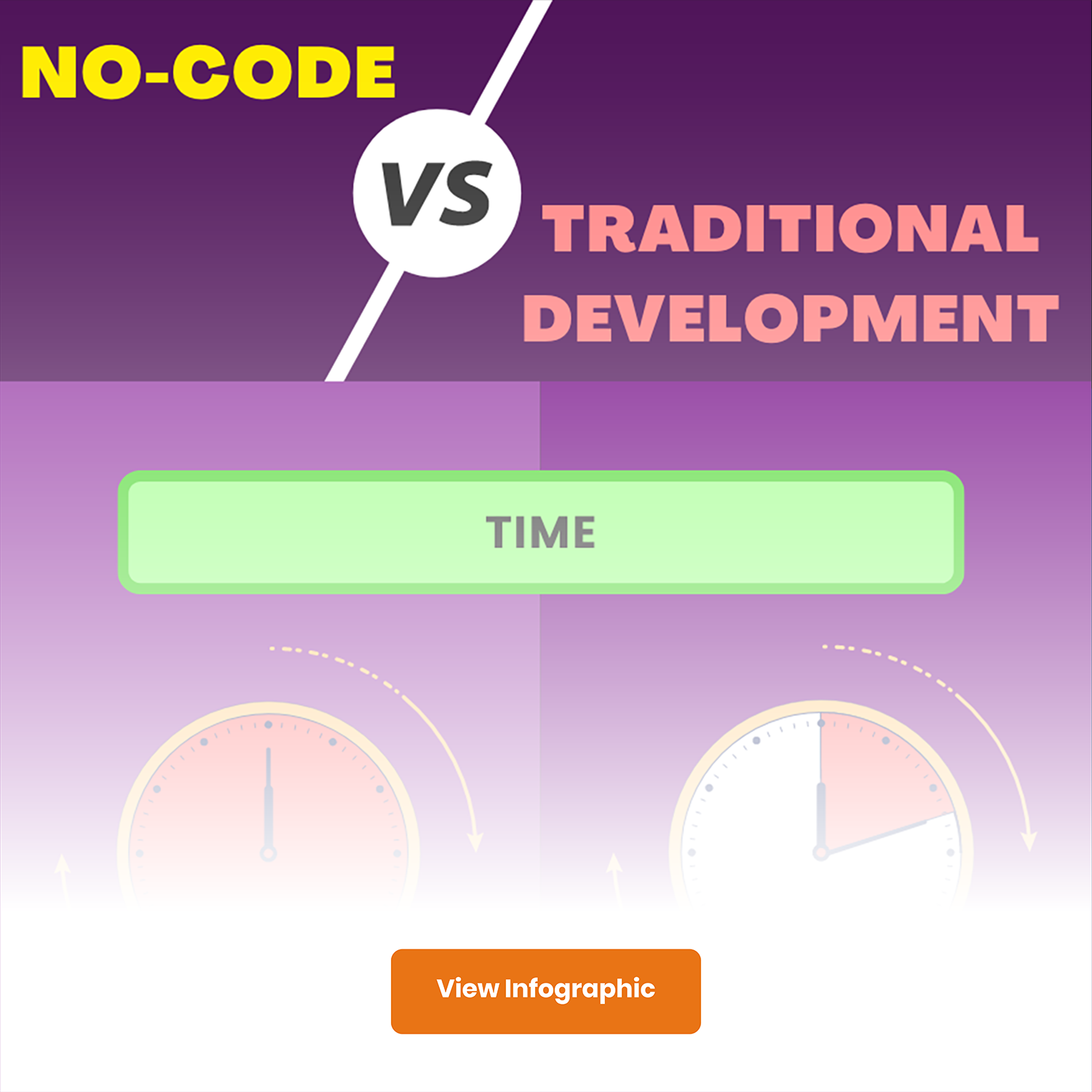
It’s the era of visual development! And that is why a war has been waged – no-code vs traditional development!
Until a couple of years ago, development and coding were synonymous. For almost all companies, app development meant choosing a platform, deciding a relevant language, writing multiple lines of code, and so on. All this consumed a lot of time and money because dedicated developers charge a lot of money!
But now, companies have a choice (finally). They have the freedom to do away with coding altogether and use no-code platforms for customized app development. Both cases’ results are the same – apps suited to business needs. So, how are they different, and why is no-code a better choice?
We shall answer these questions in our article through a thorough comparison.
What is No-Code Development?
No code is exactly how it sounds – app development without the need for a single line of code. You don’t need to have an IT or programming background to develop an app using a no-code platform. It is a visual development tool that helps you build something from scratch through selections, drag & drop, imports, and other equally simple functions.
Also read: Everything you should know about No-Code Development

Gone are the days when going digital was a matter of choice. Whether we like it or not, we have all been catapulted into digital transformation. This switch has increased the demand for automation within a business and to serve the clientele. If businesses still depend on the IT department, they will have to allocate more budgets to develop and deal with issues such as delays, bottlenecks, and so on. No-code’s feasibility and cost-effectiveness eliminate these troubles once and for all.
Using no-code, businesses can build business applications such as CRMs, help desk management, employee self-service, asset management, workflow automation, HRMS, etc.; mobile applications; and web portals.

What is Traditional Development? Aka Custom or Bespoke Development?
Custom development is the process of developing specific software programs for businesses. These programs are unique and built to satisfy a particular need. It may include bespoke integration, data extraction reports, small plug-ins, and user-friendly screens for the benefit of the user. It is often complicated and time-consuming.
Also Explore: The No-Code Meme Book
No-Code Vs Traditional Development
This battle may not be as epic as the ones we see in Star Wars, but it is equally interesting! Let’s take a closer look.

Skillset
Traditional development requires dedicated software developers with strong programming skills. It is completely manual because coding needs to be done. It is also quite complicated and puts an entire burden on the IT department. No-code, on the other hand, requires no special skills or even basic programming knowledge. Anyone from any department or user can develop and customize apps.
Edits and upgrades are also easier with no-code app development. Traditionally developed apps require the involvement of programmers for every change – no matter how small.

Time
We believe this is one of the most crucial aspects of comparison, especially today when speed is of paramount importance. No-code apps take only a few hours to develop as opposed to weeks and months. Delays and debugging are no longer points of concern either. It all happens quickly.
KPMG recently reported that 80% of projects are not delivered on time when the traditional route is taken. That’s a huge number; we are sure no business can afford that.
KPMG recently reported that 80% of projects are not delivered on time when the traditional route is taken. That’s a huge number and we are sure no business can afford that.
Cost
The costs involved are very high since traditional development requires weeks and months of development effort from experienced professional developers. No-Code platforms, on the other hand, enable business users themselves to build simple to complex custom enterprise-grade applications using visual interfaces up to 10X faster compared to traditional development. Hence the cost involved is much lower compared to traditional development.
Complexity
Traditional development gives businesses the freedom to develop complicated, enterprise-grade apps that exactly fit their requirements. The beauty of code lets them develop whatever they want. This has always been one of the strongest points of custom development.
No-code has been riddled with myths in this case. Many users believe that no-code development is only good for simple apps. The truth is that there are multiple advanced no-code platforms that let you build simple to complex enterprise-grade apps as well. However, restrictive no-code platforms may have limited capability in this area. So you must watch out during your evaluation.
Also read: Myths About Low-Code No-Code Platforms Debunked
Security
Security is another important factor in choosing between no-code vs. traditional development. It depends on the security architecture of the software as well as the hosting infrastructure. It’s important to ascertain both aspects while making the decision. Vendors that give importance to security ensure that they out in place the right security controls in place in all aspects and areas of operations. Certifications like ISO 27001 and SOC2 Type 2 act as evidence that the vendor can be trusted on the security front. So please ensure that these are part of your checklist.
Agility
Traditional apps are not really agile. A change in one step can take days, and the app may not even work while the change is being made. This can sour the customer experience. No-code apps are highly agile, allowing instant changes without interfering with the experience. In fact, they improve it by allowing the addition of features as per need and feedback.
Integration
Integration in no-code platforms can be done using ready-to-use plugins and adapters. On the other hand, integration in traditional development requires coding involving a lot of time and information exchanges between the experts of the two systems being integrated.
Also Read: What do No-Code Platforms do for Traditional Developers?
Innovation
No code makes it very easy to innovate because it frees up time and provides flexibility to think and implement simultaneously. Traditional development is usually rigid and complicated without encouraging innovation.
Maintainance
Maintaining apps in the traditional development process is a major pain, as these updates require an in-house or third-party dedicated development team. On the other hand, no-code apps are mainly run by the company that owns the platform. This simplifies the maintenance process, as upgrades will be handled by the hosting company.
Deployment
Thanks to the built-in features and templates, no-code apps can be quickly developed and put to use in no time. On the contrary, traditional development requires a number of steps to be undertaken before deployment, making the whole process of deployment slow and complex.
| Features | No-code development | Traditional development |
|---|---|---|
| Skillset | None required | Programming expertise |
| Time | Quick | Takes weeks or months |
| Cost | Less | High |
| Complexity | ||
| Security | ||
| Agility | ||
| Integration | Difficult/complicated | |
| Innovation | ||
| Maintainance | Easy | Complicated |
| Deployment | Quick | Complex |
No-code vs. traditional development – Verdict

When it comes to software development, the traditional approach often involves writing extensive code, which can be time-consuming, costly, and require specialized technical expertise. This can lead to significant IT backlogs, as businesses struggle to keep up with the ever-increasing demand for new applications and features.
No-code platforms, on the other hand, offer a more efficient and accessible solution. These platforms allow users to create custom applications without writing a single line of code, using a visual interface and pre-built components. This significantly reduces development time and costs, as businesses can rapidly build and deploy applications without relying on a large team of developers.
Here’s a breakdown of how no-code platforms compare to traditional development:
- IT backlog: No-code platforms can help alleviate IT backlogs by enabling businesses to quickly build and deploy applications without relying on a large team of developers. This frees up IT resources to focus on more strategic initiatives.
- Cost reduction: No-code platforms can significantly reduce development costs by eliminating the need for extensive coding and specialized technical expertise. This can lead to significant savings for businesses of all sizes.
- Ease of use: No-code platforms are designed to be user-friendly, making them accessible to a wider range of users, including those without extensive technical backgrounds. This empowers citizen developers to create their own applications, reducing the burden on IT departments.
- Time to market: No-code platforms can accelerate the development process, allowing businesses to bring new applications to market more quickly. This can help businesses gain a competitive advantage and respond to changing market conditions.
In conclusion, no-code platforms offer a compelling alternative to traditional development, providing businesses with a more efficient, cost-effective, and accessible way to build custom applications. By leveraging the power of no-code, businesses can reduce IT backlogs, save costs, and accelerate time to market.
Quixy – Your No-Code Platform
Think no-code; think Quixy. We are your answer to everything, no-code, with everything you need to build enterprise-grade apps without problems. Our solutions are designed to work for all industries – small and large.
Quixy is a powerful no-code, low-code platform that can significantly enhance the capabilities of IT teams. By providing a user-friendly interface and a wide range of features, Quixy enables IT professionals to:
- Accelerate application development: Build custom applications rapidly without extensive coding, freeing up IT resources to focus on strategic initiatives.
- Reduce IT backlog: Address the growing demand for applications by enabling citizen developers to create their own solutions, reducing the burden on IT teams.
- Improve collaboration: Foster collaboration between IT and business teams by providing a common platform for application development and management.
- Enhance agility: Respond quickly to changing business needs by enabling rapid application development and deployment.
- Reduce costs: Lower development and maintenance costs by eliminating the need for extensive coding and specialized technical expertise.
Quixy’s management features:
- Centralized control: Quixy provides a centralized platform for managing users, permissions, and application settings, ensuring that applications are secure and compliant.
- Simplified administration: Quixy’s intuitive interface makes it easy for administrators to manage and monitor applications without extensive technical knowledge.
- Scalability: Quixy can scale to meet the growing demands of your organization, ensuring that your applications can handle increased workloads.
- Integration with existing systems: Quixy seamlessly integrates with your existing systems and third-party applications, providing a unified platform for managing your entire IT infrastructure.
Key benefits for IT teams:
- Increased productivity: Quixy’s intuitive interface and pre-built components streamline the development process, improving efficiency and productivity.
- Reduced complexity: Quixy’s visual approach eliminates the need for complex coding, making it easier for IT teams to manage and maintain applications.
- Enhanced flexibility: Quixy’s adaptability allows IT teams to easily modify and scale applications to meet changing business requirements.
- Improved governance: Quixy provides features for managing users, permissions, and application settings, ensuring that applications are secure and compliant.
By leveraging Quixy, IT teams can become more agile, efficient, and effective, delivering value to their organizations and driving digital transformation.
Get Started Today! Empower your organization with automation and customized app development without coding.
Frequently Asked Questions (FAQs)
Q. What are Industries where no-code development is beneficial?
No-code development benefits various industries, including healthcare, finance, education, retail, and non-profit sectors. It empowers professionals in these industries to create custom solutions without relying on traditional coding, enabling faster application development and reducing dependence on IT departments.
Q. Can Switch from coding to no-code lose functionality?
Switching from coding to no-code allows developers to leverage visual interfaces and pre-built components to rapidly develop applications. While there may be limitations in customization and complex integrations, many no-code platforms offer seamless migration options to transition existing code to the no-code environment, ensuring functionality is preserved.
Q. What are advantages of no-code over traditional coding?
No-code platforms offer faster development cycles, reduced costs, and increased agility compared to traditional coding. They empower citizen developers with no coding experience to create functional applications, while professional developers can focus on more complex tasks. No-code platforms also provide intuitive interfaces, drag-and-drop functionality, and pre-built components, enabling rapid prototyping and deployment.
Q. Can complex applications be built with no-code platforms?
Yes, complex applications can be built with no-code platforms. While they may not handle highly intricate and customized functionalities as easily as traditional coding, no-code platforms continue to evolve and offer advanced capabilities. They provide robust features like workflow automation, database integration, API connections, and drag-and-drop logic builders, allowing users to build sophisticated applications without coding.
Q. What to Consider when choosing between no-code and traditional coding?
When choosing between no-code and traditional coding, factors to consider include project complexity, scalability needs, customization requirements, available skill sets, and development timeline. No-code is suitable for rapid development, quick prototyping, and citizen developers. Traditional coding provides greater flexibility, intricate customization, and complex integrations. Evaluating these factors against project goals and resource availability will help in making an informed decision.
Q. Are there any security concerns with no-code platforms?
No-code platforms generally prioritize security by implementing measures such as data encryption, user authentication, and access controls. However, organizations must still ensure proper data protection practices are in place, especially when integrating with external systems or handling sensitive information. As with any technology, thoroughly evaluating the chosen no-code platform’s security features and adherence to best practices is essential to mitigate potential security risks.
Subscribe
Login
Please login to comment
0 Comments
Oldest















